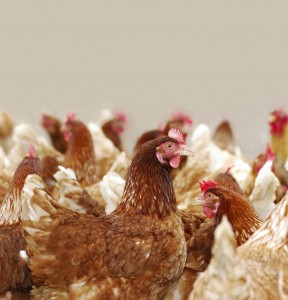Kentucky restricts sales and movement of birds as proactive response to avian flu outbreak
Posted on Jun 11, 2015  “We are taking these steps out of an abundance of caution,” Dr. Stout said. “Poultry is Kentucky’s leading agricultural commodity, and we will do everything we can to keep our commercial and backyard poultry industries secure
“We are taking these steps out of an abundance of caution,” Dr. Stout said. “Poultry is Kentucky’s leading agricultural commodity, and we will do everything we can to keep our commercial and backyard poultry industries secure
The Office of the State Veterinarian (OSV) announced the following actions:
• All avian commingling sales events, including stockyards, flea markets, and swap meets, are banned. Sales of birds will not be allowed at any fair or show. A private sale with direct intrastate farm-to-farm movement is allowed per state regulation 302 KAR 20.065, section 7.
• Entry of birds into Kentucky for sale is restricted to poultry from facilities certified by the National Poultry Improvement Plan (NPIP) as free of H5 or H7 viruses. Entry from certified H5/H7-clean facilities within a state with highly pathogenic avian influenza (HPAI) infections must meet Kentucky regulatory requirements. Entry from facilities within an HPAI control zone is banned.
• Entry of poultry into Kentucky for private sale or movement must be permitted by the Office of the State Veterinarian and will be considered on a case-by-case basis.
• Game bird permit applications must originate from an NPIP-certified H5/H7-clean facility that meets the requirements of the OSV’s poultry restrictions memo. Persons seeking a game bird permit also must obtain a transportation permit from the Kentucky Department of Fish and Wildlife Resources.
• Exhibition events, shows, and fairs will be restricted to in-state birds only. No out-of-state birds will be allowed into Kentucky for exhibition purposes. All birds presented for exhibition shall be subject to inspection by Kentucky Department of Agriculture personnel.
The Office of the State Veterinarian, an agency of the Kentucky Department of Agriculture, works with the University of Kentucky, USDA, other government agencies, private veterinary practitioners, and producers to prevent and eradicate disease in Kentucky livestock and poultry.
Dr. Stout encouraged poultry producers and all other bird owners to take biosecurity measures to prevent their birds from being infected with avian influenza or other bird diseases:
• Keep your distance – Isolate your birds from visitors and other birds.
• Keep it clean – Prevent germs from spreading by cleaning shoes, tools and equipment.
• Don’t haul disease home – Clean vehicles and cages.
• Don’t borrow from your neighbor – Avoid sharing tools and equipment with neighbors.
• Know the signs – Watch for early signs to prevent the spread of disease
• Report sick birds – Report unusual signs of disease or unexpected deaths to the Office of the Kentucky State Veterinarian at (502) 573-0282, option 3, or through USDA’s toll-free number at 1-866-536-7593.
In late April, the U.S. Department of Agriculture's Animal and Plant Health Inspection Service confirmed the presence of highly pathogenic H5N2 avian influenza in two wild birds in McCracken County. There have been no detections in domestic flocks in Kentucky.
Avian influenza has been reported in 21 states since last December, and approximately 50 million birds have been affected, including about 29.1 million in Iowa alone.
The U.S. Centers for Disease Control and Prevention considers the risk to humans from the HPAI viruses in the current outbreak to be low. No human HPAI infections have been detected in the United States to date.
Kentucky’s poultry industry generated an estimated $1.2 billion in farm cash receipts in 2013, the Kentucky office of the National Agricultural Statistics Service reported. Kentucky farmers produced 309 million broilers and more than 1.1 billion eggs in 2013.
Kentucky entry requirements are listed on the OSV website at http://www.kyagr.com/statevet/import-poultry-ratites.html. For more biosecurity tips and other information about avian influenza, go to http://healthybirds.aphis.usda.gov/.
Source: Kentucky Department of Agriculture Press Release
Tagged Post Topics Include: Agriculture, Applications, Avian Influenza, Biosecurity, Bird, CDC, Commingling Sales, Commodity, Diseases, farm, Flea Markets, Frankfort, Game Bird, H5, H5N2, H7, Highly Pathogenic Avian Influenza, HPAI, Industry, Kentucky, Kentucky Department of Agriculture, Kentucky Department of Fish and Wildlife Resources, KY, McCracken County, NASS, National Agricultural Statistics Service, National Poultry Improvement Plan, NPIP, Office of the State Veterinarian, OSV, Outbreak, Pathogen, Permit, Poultry, Poultry Industry, Restrictions, Robert C Stout, Stockyards, Swap Meets, The Office of the State Veterinarian, The US Centers for Disease Control and Prevention, US Department of Agriculture's Animal and Plant Health Inspection Service, UK, United States Department of Agriculture, University of Kentucky, USDA, USDA APHIS, Veterinarian, Viruses
Comments